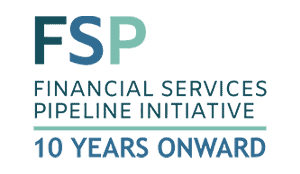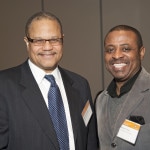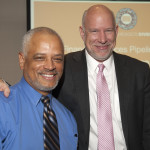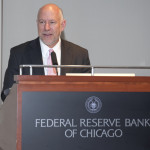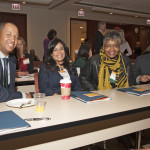FSP Initiative Hosts First Annual Summit
Chicago Area Financial Services Industry Leaders Make a Formal Commitment to Diversity and Inclusion
On November 20, 2014, more than 120 executives and professionals from human resources, diversity and inclusion, community development and philanthropy, along with representatives of the Federal Reserve’s Board of Governors staff and several Reserve Banks, convened at the Financial Services Pipeline Initiative’s first major event, its Summit.
The Initiative, a collaborative effort between the region’s community foundation – The Chicago Community Trust – and leading financial services organizations in the Chicago area, seeks to increase the representation of African-Americans and Latinos, at all levels, as well as improve the overall cultural competency in the financial sector of the Chicago area. Frederick Waddell, the CEO of one of the Initiative’s member firms, Northern Trust, commented on the goals of the Initiative via video: “[we recognize] that the demographics of our clients and prospects are shifting. Integral to serving these clients is our ability to attract, hire and retain a diverse workforce to provide consistent and innovative solutions to our clients around the globe. The Financial Services Pipeline initiative is providing an advanced platform to expand upon our commitment to diversity & inclusion.”
The Summit served as an introduction to the initiative and a platform for sharing the resources, initial plans and research that members have committed to addressing the challenge. A keynote speech and breakout sessions also provided opportunities for the Initiative to solicit lessons and ideas from other programs and firms. Discussions centered on the following areas, which also served as topics for the breakout sessions: “Early recruiting: College and before;” “Filling key jobs with diverse talent;” “Supporting people of color in their early to mid-career;” and “Cultural competency in the financial sector.” Many attendees, particularly those from human resources, expressed concerns about low representation of Latinos and African-Americans in their applicant pools for mid to high-level management positions and retention of those candidates once they were hired.
Frank Ross, director of the Center for Accounting Education at Howard University addressed these concerns in his keynote speech and drew parallels to the accounting profession, where this underrepresentation is also evident. Pulling lessons from the Pipeline Project, an initiative to increase diversity in the accounting profession, he highlighted how high school and college programs that expose students to the profession at a young age and provide them with committed professional networks have expanded the pipeline of diverse candidates interested in the field. The Project’s success with mentorship and other resources in helping interested candidates gain certification in the field – a step that encourages retention in the profession – also serves as a lesson for the financial services industry.
Another major focus of the Summit was the release of the FSP Initiative 2014 Index. The Index offers a snapshot of the racial and ethnic diversity within Chicago metro’s financial sector from 2008-2013, with a focus on African-American and Latino representation. The Index contextualizes the data, comparing statistics from the Chicago area to national trends, and serves as a tracking mechanism. Monica Walker, Holland Capital Management CEO, remarked: “My hope is that this groundbreaking research will be a solid foundation to develop a human capital strategy for the financial sector inclusive of the interests and perspectives of African-Americans and Latinos.”
Insights from discussions during the conference have already prompted action. Initiative members have created working groups tasked with developing innovative strategies around recruitment, retention and cultural competency in the industry. FSP members hope to leverage the success of the Summit to grow the collaborative effort within the Chicago area industry and further the dialogue around addressing the challenge of underrepresentation of Latinos and African-Africans in the sector.
